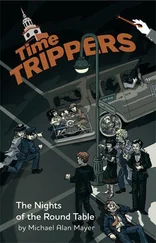“But, sir, what’s he done that’s so terrible?” Otto asked ingenuously.
“He’s been making speeches, so-called defeatist speeches. In the presence of Frenchmen, what’s more.”
“Oh, they didn’t understand half of it. Hartmann speaks French like a first-term beginner.”
“Otto,” said General Kahlenberge, suspicion dawning in his eyes, “were you there, too?”
“Pure coincidence, sir. I was sitting at the bar having a drink when Hartmann suddenly sounded off.”
“Why didn’t you shut him up?”
“He was well away by that time, sir. Also, I didn’t quite get what he was blathering about to begin with. It was all about international understanding, I think.”
“And this was in a brothel?”
“Not a brothel, sir, I swear it—just an ordinary bar.”
“Fair enough,” said Kahlenberge good-humouredly. “I’ll keep you out of the firing-line if they start making any inquiries. But I shan’t lift a finger to help Hartmann—not yet, anyway. Let him cool his heels for a day or two. Maybe it’ll teach him how dangerous it can be, fooling around like that. Later on I’ll dig him out of the shit again. God knows why! He’ll probably have another paroxysm of brotherly love before long. Well, is that all?”
“There’s one point, sir.” Otto switched abruptly to the role of spiritual adviser, a part which he played execrably-much to Kahlenberge’s amusement. “It might be worth remembering that if Hartmann is questioned and has to mention names it won’t be only my name he mentions. There’s someone else involved.”
General Kahlenberge tilted his jaw and studied Otto silently for a moment. His thoughts appeared to be travelling along the right lines. “Otto! You’re not suggesting that Fräulein von Seydlitz-Gabler is mixed up in this, too?”
“Yes, sir.” Otto’s voice was tinged with admiration for Kahlenberge’s sixth sense where matters of delicacy were concerned. “I was detailed to pick up the young lady from the opera yesterday and drive her to her hotel. We made a little detour on the way.”
Kahlenberge seized a ruler and smacked his palm with it loudly, fixing Otto with a quizzical stare. At length he said: “I trust you aren’t planning to spend your leisure time hobnobbing with generals’ daughters.”
“You needn’t worry about that, sir,” Otto protested vigorously. “I’m not a fool. Quite apart from that, the girl’s not my type. I like something you can get hold of.”
Although Kahlenberge was overloaded with work, anything to do with the von Seydlitz-Gabler family interested him intensely. He pressed Otto for details.
Otto hesitated for a few moments to whet Kahlenberge’s appetite. Then he came out with it, eyes alight with glee. Ulrike von Seydlitz-Gabler had quite a thing about Hartmann, he said. Her voice went all husky whenever she spoke to him or talked about him. The whole business had started in Warsaw under cover of a common interest in music, notably Chopin. It had all been very romantic—little walks hand in hand, exchanges of letters, etc., etc. “Touching, sir, isn’t it?” Otto concluded.
General Kahlenberge replaced the ruler on his desk. Crow’s-feet of merriment appeared at the corners of his eyes.
“Call garrison headquarters for me, Otto. Hartmann is to be transferred here immediately. I’ll take care of any details later.”
Otto withdrew happily and Kahlenberge, surrounded by members of his staff, at once plunged into the mass of paper work that littered his desk. He issued instructions with the crisp precision of a computer punching cards. After an hour, his assistants were drenched in sweat while he still looked as pink and contented as a freshly bathed baby. This buzz of activity continued until General von Seydlitz-Gabler appeared.
The G.O.C.’s arrival signalled the beginning of the so-called overall planning phase. Immediate objectives were defined more clearly and long-range objectives examined more closely. Human beings were converted into the columns of figures so dear to the hearts of logistics experts. Finally, conversation turned to more specialized problems.
“Yesterday evening,” Kahlenberge said confidentially, “I had a talk with a group of reliable officers. There were two generals among them. Shall I quote names?”
“Please don’t!” Von Seydlitz-Gabler discreetly raised a well-manicured hand.
“Anyway, they’re unanimously agreed that something must be done if we’re to avoid total disaster, and in their view the situation warrants extreme measures. They’re counting on you, sir.”
Von Seydlitz-Gabler demanded fuller information on various points, his intellectual’s brow furrowed in thought. He gave several portentous nods.
“Please keep meau courant, my dear fellow,” he said finally. “I’m not fundamentally opposed to your aims, but I refuse to sanction them unthinkingly. Above all, I emphatically warn you against any ill-considered use of force. I need hardly impress on you that this conversation never took place—but I think I can say with a good conscience that if my country need me I shall not ignore the call of duty.”
Kahlenberge accepted this noncommittal assurance at its face value. He hadn’t expected anything more, but he made a point of praising the Corps Commander’s unequalled foresight and sense of responsibility.
“Now for the next point,” said von Seydlitz-Gabler. “Tanz is on his way here with orders to report to me. He’s been temporarily placed under my command, and it’s our job to see that his severely depleted division is brought up to strength as soon as possible.”
The next half hour was spent in routine discussion. Both men realized that Tanz’s division would soak up more than just their reserves. Since Tanz enjoyed the favour of the Supreme Commander, only the best would be good enough for him.
“There are going to be a lot of problems,” said Kahlenberge. “Tanz is not a man to be trifled with.”
“He and his men have fought heroically. A pause for recreation would do him a world of good.”
“An excellent idea, sir!” Kahlenberge at once saw possibilities opening up. They might be able to divert Tanz—isolate him, even. However long the respite lasted, it would be worth it.
“General Tanz,” said von Seydlitz-Gabler in his most paternal tones, “is universally respected, by my family in particular. I’m sure my wife will be only too happy to entertain our worthy colleague to the best of her ability, and I’ve no doubt my daughter will help her.”
“Splendid!” said Kahlenberge.
“We can’t entertain him the whole time, of course. That would be overdoing it. What I suggest is that we arrange a few pleasant, peaceful days for General Tanz. Let him devote himself to the Muses, as it were. He shouldn’t find that too irksome in this city. What do you think?”
“I think I know just the man to handle General Tanz’s concentrated programme of entertainment,” said Kahlenberge. “A lad named Hartmann—you may remember him.”
General Tanz’s arrival was scheduled—or ordered, whichever way one cared to regard it—for four o’clock. At three fifty-five, Generals von Seydlitz-Gabler and Kahlenberge posted themselves at a window in the Moulin Noir, confident that they would not have to wait a moment in vain. General Tanz was as punctual as Radio Berlin, the State Railways, or death itself.
At three fifty-seven precisely a motor-cyclist hove into view—General Tanz’s outrider—immediately followed by a Mercedes staff car. It was the same model as that used by Tanz in Warsaw but the fourth in the series. The other three had vanished into the limbo of war.
In the front seats, motionless as statues, sat General Tanz and the durable Sergeant Stoss, whose gloved hands grasped the steering wheel in text-book fashion. In the back sat Lieutenant-Colonel Sandauer, tried and tested G.S.O.1 of the Nibelungen Division, and beside him the General’s combat orderly—the latest in the unending succession.
Читать дальше












